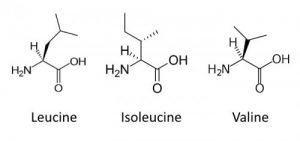Introduction
Branched-chain amino acids (BCAAs) are three of the amino acids that we find in nature. They are called branched-chain amino acids due to their molecular structure which makes them slightly different. Specifically, they are leucine, isoleucine, and valine. They have received a lot of attention for their potential role in building muscle and helping to manage blood glucose levels.

While they have been very popular and widely used, do you need to take BCAAs? This is the question we are going to answer in this article on our NutriWiki.
Do I need to take BCAAs?
Short Answer
BCAAs (branch chained amino acids) are not needed if you have an adequate daily protein intake. Almost every single person consumes enough of these amino acids in their daily diet to make supplementation with them largely ineffective.
Long Answer
High quality protein in our diets is already made of 15-25% of BCAAs and supplementation may bring that up to 20-30% if it is taken in high doses and regularly.
There have been several studies that have examined if BCAAs are effective for either muscle growth or weight loss. Many people use BCAAs to help maintain muscle tissue and increase fat loss during periods of dieting (i.e. caloric restriction). In an examination of a recent study, supplementing with BCAAs did not benefit individuals during a caloric deficit when compared to a placebo.[1]
There have been many lines of investigation examining if BCAAs help with muscle growth. While there is some evidence that they might stimulate muscle protein synthesis, they do not appear to really be effective for muscle growth[2].
Lastly, many companies that sell these supplements will market their products as “zero calories”, but they do contain calories, so make sure you account for them in your daily caloric intake, especially if you are consuming more than a single serving in a day (a typical serving contains ~20 kcals)
